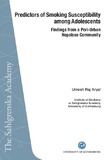Please use this identifier to cite or link to this item:
http://archive.nnl.gov.np:8080/handle/123456789/138Full metadata record
| DC Field | Value | Language |
|---|---|---|
| dc.contributor.author | Aryal, Umesh Raj | |
| dc.date.accessioned | 2018-06-01T08:48:46Z | |
| dc.date.accessioned | 2020-08-21T07:25:58Z | - |
| dc.date.available | 2018-06-01T08:48:46Z | |
| dc.date.available | 2020-08-21T07:25:58Z | - |
| dc.date.issued | 2018-06-01 | |
| dc.identifier.uri | http://103.69.125.248:8080/xmlui/handle/123456789/138 | - |
| dc.description | Doctoral thesis for the degree of Doctor of Philosophy (PhD) in Medical Science, University of Gothenburg, Sweden, 2014. | en_US |
| dc.description.abstract | Susceptibility to smoking in adolescence is an important indicator of future smoking. Identifying smoking susceptibility and its associated psychosocial factors helps reduce smoking initiation. Objectives: This thesis aimed to establish a health demographic surveillance site and examine psychosocial factors among non-smoking adolescents who demonstrated susceptibility to smoking initiation. Methods: To establish the health demographic surveillance site, a baseline survey was conducted in Jhaukhel and Duwakot villages, a peri-urban area in the Bhaktapur district of Nepal. Next, a community-based cross-sectional study was conducted among 352 randomly selected non-smoking adolescents. Further, eight focus group discussions included 71 adolescent students. Results: A baseline survey revealed there were 2,712 households with 13,669 individuals. Among individuals older than 18 years of age, nearly 15% were current smokers. Multivariable logistic regression demonstrated that personal and environmental factors strongly predict smoking susceptibility. The content analysis showed that participants were unaware about short-term health consequences of smoking. Smoking initiation related to socio-environmental factors and participants expressed confidence that they would be able to resist peer pressure and refuse to smoke. They agreed that both government and schools should have strict rules about smoking. Conclusion: This thesis demonstrates that it is possible to collect accurate and reliable data in a peri-urban area to establish a demographic surveillance site in Nepal, and reveals several psychosocial factors that influence smoking-susceptible adolescents. Thus, effective smoking prevention programs must incorporate psychosocial factors that prevent smoking initiation in adolescents. | en_US |
| dc.language.iso | en | en_US |
| dc.subject | Adolescents | en_US |
| dc.subject | Smoking susceptibility | en_US |
| dc.subject | Smoking--Psychosocial factors--Nepal | en_US |
| dc.title | Predictors of smoking susceptibility among adolescents : findings from a peri-urban Nepalese community | en_US |
| dc.type | Thesis | en_US |
| Appears in Collections: | 300 Social sciences | |
Files in This Item:
| File | Description | Size | Format | |
|---|---|---|---|---|
| 80- Dr Umesh raj Aryal,.pdf | 6.23 MB | Adobe PDF |  View/Open |
Items in DSpace are protected by copyright, with all rights reserved, unless otherwise indicated.